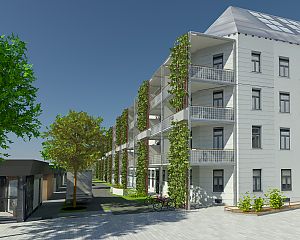MEIDLINGER L Demo
Short Description
Starting point /motivation
38% of total CO2 emissions from residential buildings are attributable to final energy consumption, with heating, cooling and water heating accounting for the largest share. 43% of emissions are caused by motorized private transport; increasing mobility requirements and the increased volume of goods traffic must be managed.
The street space must be redesigned: greener, shadier and cooler, gender-sensitive, safe, suitable for everyday use and with more space for active mobility, such as cycling and walking, as well as efficient public transport and sharing services. The interfaces between public street space and private living space are distributed across more than nine different municipal authorities due to laws, regulations and responsibilities. It is an extremely complex task to involve stakeholders through suitable participation processes.
Contents and goals
- With the MEIDLINGER L demo project, a scalable and multipliable model for Vienna and other cities is now being further developed and demonstrated.
- Technical and legal feasibility will be tested (demonstrating the process) and economic affordability will be implemented with a financing model:
- The construction of the MEIDLINGER L to demonstrate the technical solution "rank shelf system" at the public-private interface, as well as the legal, regulatory and organizational solution for implementation.
- Included are measures to adapt to climate change by means of vertical and horizontal greening, rainwater retention and traffic redesign, as well as the reduction of energy consumption and the use of renewable energies.
- Furthermore, a financing model and a business model for multipliability are being developed.
- The project also aims to reorganize the public space at the interface with private housing, taking into account the adjacent market area.

Methods
- Regular project meetings are organized and monitored to ensure that the work plan is adhered to.
- In work package "Governance and Interfaces", we are using different participation formats to involve local residents.
- Work package "Planning and Approval" uses integrative planning to develop a concept with all stakeholders, authorities and owners.
- A financing and business model is developed in work package 4 based on discussions and workshops with banks and experts.
- The structural prototype development and implementation in work package 5 creates modular service packages and separable service phases in close cooperation with planners, authorities, owners and tenants.
- In work package "Monitoring", vegetation, energy and social science monitoring will be carried out.
- Dissemination and UItilization will take place based on (popular) scientific publications and (inter)national lectures.
Expected results
Implementation of the project: to enable a cost-effective and uncomplicated, rapid use of retrofitting with the MEIDLINGER L modular rank shelf system in existing urban buildings.
Project Partners
Project management
GRÜNSTATTGRAU Forschungs- und Innovations- GmbH
Project or cooperation partners
- EIGENSINN - Veränderung RAUM geben
- RENOWAVE.AT e.G.
- RATAPLAN-ARCHITEKTUR ZT GmbH
- BOKU Wien, Institut f. Ingenieurbiologie und Landschaftsbau
- BLUESAVE | Unternehmens- und Immobilienberater
- Tbw RESEARCH
- Raunicher + Partner Bauingenieure ZT GmbH
- Schöberl & Pöll GmbH Bauphysik und Forschung
- Ingenieurbüro Robert Zöchling
- arconsol
- Schreiber & Partner Rechtsanwälte
Contact Address
Susanne Formanek
Favoritenstraße 50
A-1040 Vienna
Tel. +43 (650) 634 96 31
E-mail: susanne.formanek@gruenstattgrau.at
Web: www.gruenstattgrau.at

